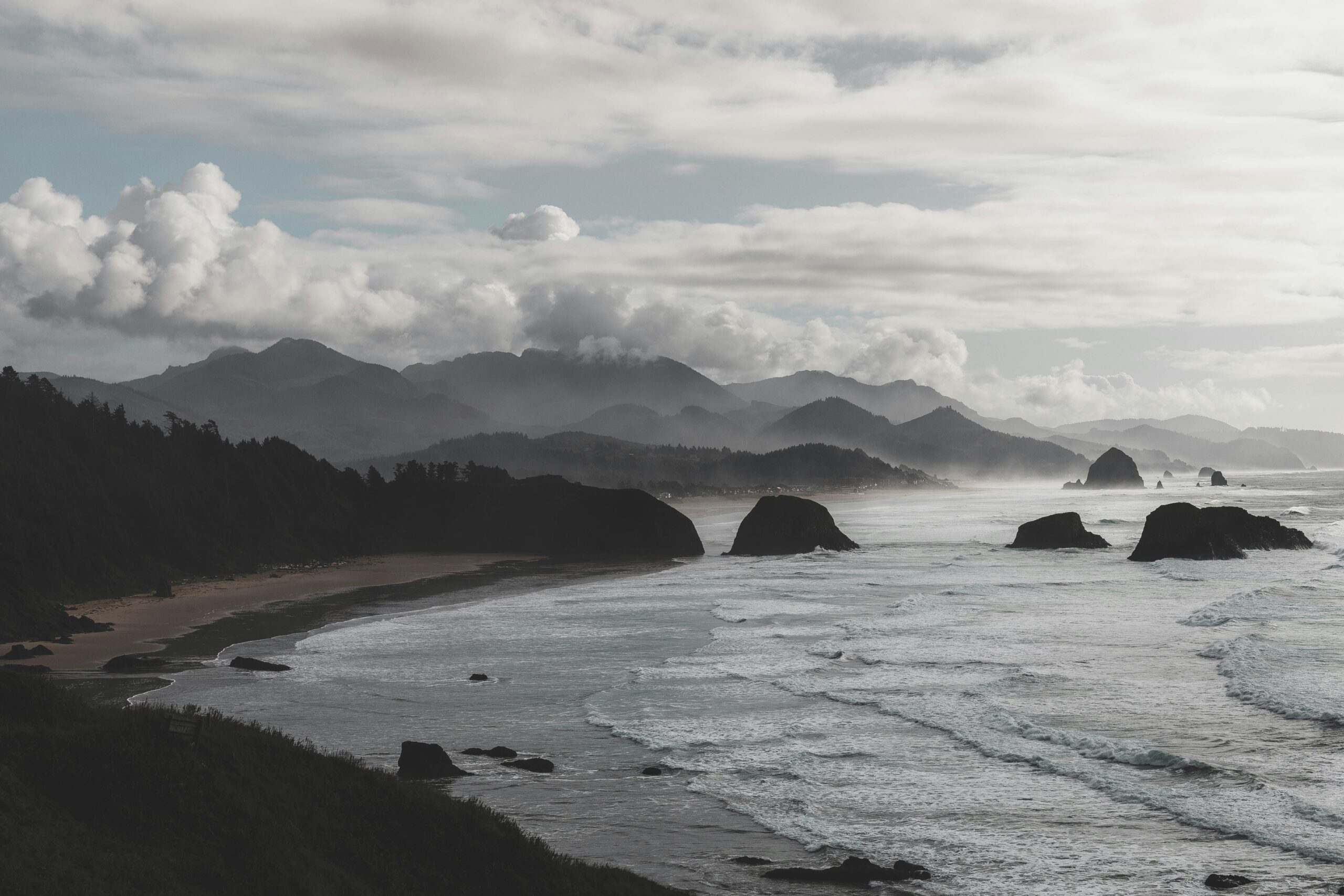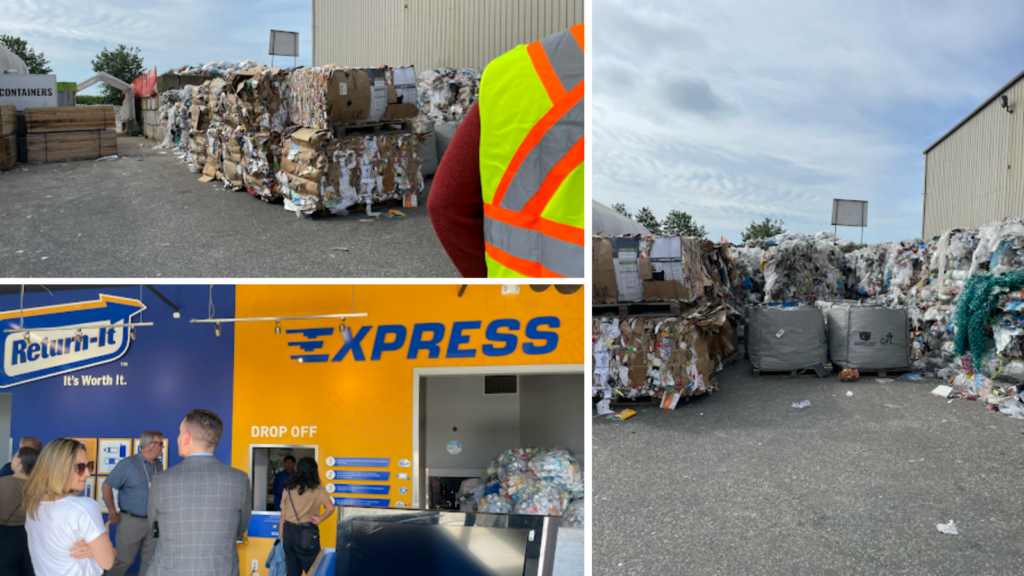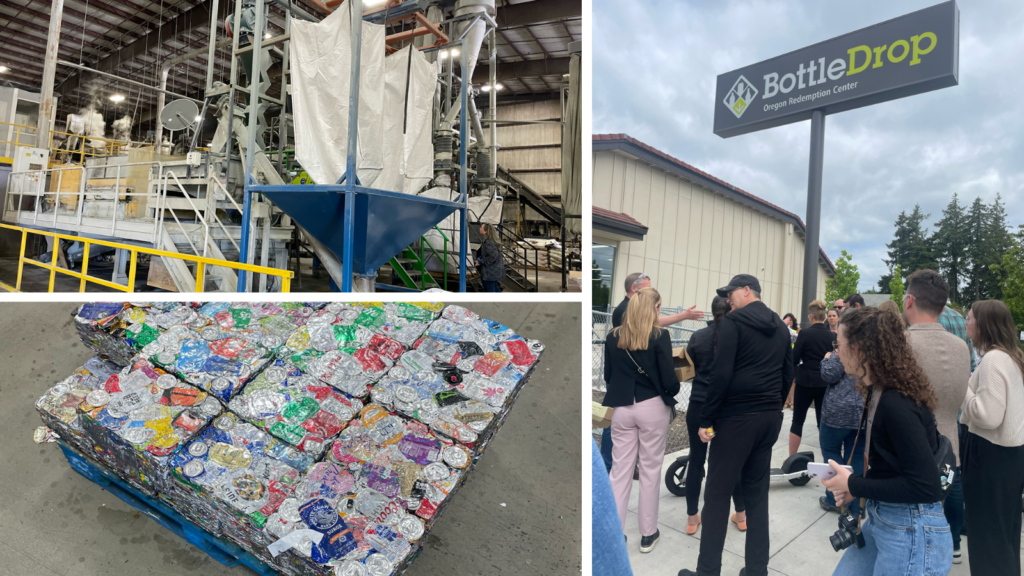
Events
Convening Northwest Legislators Around Plastic Pollution Practices
May 28, 2024
On May 14 through May 17, 2024, legislators gathered in Vancouver, Canada, to participate in The Ocean Plastic Leadership Network’s 2024 Pacific Northwest Technical Expedition – a three-day trip traveling from Vancouver to Portland visiting 12 sites along the way. Seven legislators and staffers from six states gained insights in recycling and material management while learning about best practices for extended producer responsibility (EPR) and deposit return system (DRS) policies.
Day 1: May 15
British Columbia is considered the birthplace of EPR in North America, making it an apt starting point for the expedition. Participants’ first tour took place at Green For Life (GFL) Environmental’s Richmond material recovery facility (MRF), the fourth largest MRF in North America. Next, participants toured the Central Surrey Recycling and Waste Centre, a free recycling depot that provides convenient recycling drop-off options for residents and businesses. About a dozen stewardship programs are represented at this location, where recycling drop-off categories include: e-waste, paint, cooking oil, gasoline, scrap metal, small and large appliances, and more.
Legislators then toured the Centre for Material Intelligence and received a program overview of Recycle BC and the Centre’s work. Recycle BC is a nonprofit organization responsible for residential packaging and paper product recycling throughout British Columbia. The Centre performs waste audits of Recycle BC’s programs and conducts studies of recycling packaging and paper products, from composition and characteristics of these materials, to human behavior surrounding their recycling. A tour and overview of Return-It Express Plus in North Vancouver offered the chance to see how a compact location can provide a convenient and cashless way to recycle used beverage containers and other small household items.
The afternoon began with a presentation from Encorp, a product stewardship agency with three decades of experience. With beverage container management as its core business, Encorp’s mandate is to develop, manage, and improve systems to recover used packaging and products from consumers and ensure that they are properly recycled.
The next presentation came from the Binners’ Project, an organization that fosters social and economic inclusion, builds community resilience and stronger networks, and engages on sustainability issues. “Binner” is the Canadian term for a waste picker or canner, a person who collects redeemable containers and other items from bins to sustain their livelihood and to divert waste from landfills. Composed of about 150 active members (50% are Indigenous) the Binners’ Project holds weekly meetings, provides uniforms, advocates for cash to be available in the redemption system, and offers micro cleaning services for events and pop-ups.
Circular Materials followed up with an overview of their work as Canada’s national nonprofit producer responsibility organization (PRO) created and governed by producers. With a range of EPR models and timelines existing across Canada’s provinces and territories, producers recognize the value of a nationally integrated approach to support Canada’s transition to EPR. Circular Materials supports producers in meeting obligations under EPR regulations for packaging and printer paper products across Canada. Legislators learned about the distinction between full and shared EPR – one managed by producers and the other managed by producers and governments, respectively – as well as the pros and cons of regulatory models across Canada and the perennial problem of contamination.

Images: GFL Material Recovery Facility, Richmond, B.C.; GFL Material Recovery Facility, Richmond, B.C.; Express Plus, Vancouver, B.C.
Day 2: May 16
Day two began with participants traveling from Vancouver to Seattle for a policy roundtable hosted by Washington State Representative Elizabeth Berry, the primary sponsor of WA HB 2049, known as the Re-WRAP Act. The roundtable highlighted the WRAP Act of 2023 (SB 5154 / HB 1131) as well as the importance of support from the labor community.
Participants then toured both Strategic Materials’ glass processing plant, the largest glass recycling company in the U.S., and Ardagh’s glass bottle manufacturing plant. Strategic Materials processes curbside glass and other collected glass from MRFs that sort material from various municipalities. Legislators were intrigued to see a distinct difference in the quality and cleanliness of raw materials processed from Seattle, where there is not yet an EPR or DRS policy, and bottle bill glass from Oregon or British Columbia. Materials from locations with EPR/DRS policies are higher quality and cleaner due to dedicated recycling streams for glass and less contamination.
Participants then traveled down to Portland to round out the night with dinner at Andina, where Abby Boudouris, a Senior Legislative Analyst, and Nicole Portley, Program Plan Lead at the Oregon Department of Environment Quality, delivered a keynote address on Oregon’s EPR legislation, the Plastic Pollution and Recycling Modernization Act. The bill – SB 582, passed in 2021 – is EPR for printed paper, packaging, and food serviceware. The program is a shared responsibility model and includes expanded and improved recycling services, a statewide collection list, material processing, education and contamination reduction, as well as measures to address plastic pollution.

Image: Legislators Gathered at a glass recycling facility, Seattle, WA; Legislators at a Policy Roundtable, names left to right: Sen. Dawn Euer (RI), Rep. Brandy Donaghy (WA), Sen. Nan Orrock (GA), Rep. Beth Doglio (WA), Rep. Liz Berry (WA), Sen. Heidi Campbell (TN), Sen. Janeen Sollman (OR)
Day 3: May 17
The final day of the expedition began with a roundtable discussion at Ground Score Association, part of the International Alliance of Waste Pickers. Ground Score is an association of informal recyclers, canners, and other environmental workers who create and fill low-barrier waste management jobs. Ground Score prioritizes work opportunities for those facing work and housing insecurity while paying a living wage and ensuring all workers have access to benefits such as health care. Legislators continued on to see The People’s Depot, a beverage container redemption center started in 2020, when beverage container collection was paused due to the pandemic. With funding from the Oregon Beverage and Recycling Cooperative (OBRC), the People’s Depot processes 30,000 beverage containers a day.
Participants then toured two beverage container drop-off locations. The Glisan BottleDrop Redemption Center is one of 27 full-service redemption centers and includes reverse vending machines, BottleDrop, and a mini MRF system that serve a variety of consumers and provide cash and cashless redemption options. The Fred Meyer Dealer Retail Bag Drop in Clackamas provides Oregonians with a convenient drop-off location with the option to obtain cash or store credit for beverage containers.
The next stop on the tour was the OBRC headquarters in Clackamas, the center of Oregon’s deposit return system. Oregon’s bottle bill was originally passed in 1971, making it the first in the nation. The OBRC was established in 2009 as the industry steward of Oregon’s beverage container redemption program, providing recovery, reuse, and recycling services to partner distributors, retailers, and to the public. The OBRC continues to innovate with its Green Bag and Blue Bag programs as well as a beer bottle reuse and refill program.
The final tour of the expedition took place at ORPET, Oregon’s state-of-the-art polyethylene terephthalate (PET) recycling facility designed and built to process post-consumer PET bottles into clean PET flake or rPET (recycled PET). PET flake from ORPET is often used to make new plastic bottles, plastic strapping, clamshells for fruit, and polyester fiber for clothing, blankets and carpet. The expedition concluded at Double Mountain Overlook Taproom. Double Mountain pioneered a beer refill program, partnering with OBRC as the flagship brewery for a pilot reuse project and to create a standardized Oregon bottle.

Image: ORPET Recycling Facility, St. Helens, OR; Crushed Cans; Legislators Gathered at Bottle Drop, Portland, OR
Looking Ahead
Legislators are excited to take what they’ve learned back to their states to continue pursuing EPR and DRS legislation. This year at least 17 states are considering EPR and/or DRS legislation, with Minnesota recently becoming the fifth state to enact EPR for packaging legislation. We expect to see this continue to increase in the coming years.